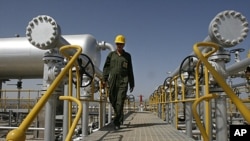WHITE HOUSE -- The Obama administration has exempted China and Singapore from economic sanctions against countries that import oil from Iran. The tougher U.S. sanctions took effect Thursday.
A statement from Secretary of State Hillary Clinton says China and Singapore have significantly reduced their imports of Iranian oil.
As a result, banks in those two countries and 18 others will not be cut off from the U.S. financial system.
U.S. officials say China has cut its imports from Iran by one-fourth since January, and Singapore has committed to stop buying any Iranian oil.
The exemption is good for 180 days.
The Republican who leads the House of Representatives Foreign Affairs Committee says the administration is giving China a "free pass." Representative Ileana Ros-Lehtinen Thursday called Beijing "Iran's biggest enabler."
Thursday was Washington's deadline for banks to stop processing petroleum transactions with Iran.
The aim of the sanctions is to pressure Tehran to prove that it is not trying to develop nuclear weapons. Iranian officials say their nuclear program is for peaceful purposes.
The U.S. says Iran's oil exports have dropped sharply, and its currency is down by about 40 percent. Senior administration officials project that cuts in oil exports will cost Iran about $8 billion.
Michael Adler, a public policy scholar at Washington's Wilson Center, says that while Iran’s economy is being hurt, he does not believe the sanctions will persuade the leaders in Tehran to give up their nuclear ambitions.
"They have large reserves of foreign currency," said Adler. "They are still earning about $44 billion a year, even with the lessened revenue, so Iran is standing tough for now."
Three rounds of recent negotiations between the P5+1 nations (United States, Britain, China, France, Germany, Russia) and Iran did not lead to an agreement on Iran's nuclear program.
Adler says the failure of the third round of talks, held last week in Moscow, led the two sides to decide against another round of high-level talks.
"Moscow was the time for real talks to begin on the nuts and bolts of the proposal, and ironically, real talks did begin," he said. "They really did discuss the nuts and bolts. But unfortunately, there was talk and no agreement. There was engagement but there was no bargaining."
Nuclear experts from both sides will meet next Tuesday to discuss technical issues.
The European Union's embargo on Iranian oil will take effect on Sunday.
A statement from Secretary of State Hillary Clinton says China and Singapore have significantly reduced their imports of Iranian oil.
As a result, banks in those two countries and 18 others will not be cut off from the U.S. financial system.
U.S. officials say China has cut its imports from Iran by one-fourth since January, and Singapore has committed to stop buying any Iranian oil.
The exemption is good for 180 days.
The Republican who leads the House of Representatives Foreign Affairs Committee says the administration is giving China a "free pass." Representative Ileana Ros-Lehtinen Thursday called Beijing "Iran's biggest enabler."
Thursday was Washington's deadline for banks to stop processing petroleum transactions with Iran.
The aim of the sanctions is to pressure Tehran to prove that it is not trying to develop nuclear weapons. Iranian officials say their nuclear program is for peaceful purposes.
The U.S. says Iran's oil exports have dropped sharply, and its currency is down by about 40 percent. Senior administration officials project that cuts in oil exports will cost Iran about $8 billion.
Michael Adler, a public policy scholar at Washington's Wilson Center, says that while Iran’s economy is being hurt, he does not believe the sanctions will persuade the leaders in Tehran to give up their nuclear ambitions.
"They have large reserves of foreign currency," said Adler. "They are still earning about $44 billion a year, even with the lessened revenue, so Iran is standing tough for now."
Three rounds of recent negotiations between the P5+1 nations (United States, Britain, China, France, Germany, Russia) and Iran did not lead to an agreement on Iran's nuclear program.
Adler says the failure of the third round of talks, held last week in Moscow, led the two sides to decide against another round of high-level talks.
"Moscow was the time for real talks to begin on the nuts and bolts of the proposal, and ironically, real talks did begin," he said. "They really did discuss the nuts and bolts. But unfortunately, there was talk and no agreement. There was engagement but there was no bargaining."
Nuclear experts from both sides will meet next Tuesday to discuss technical issues.
The European Union's embargo on Iranian oil will take effect on Sunday.










